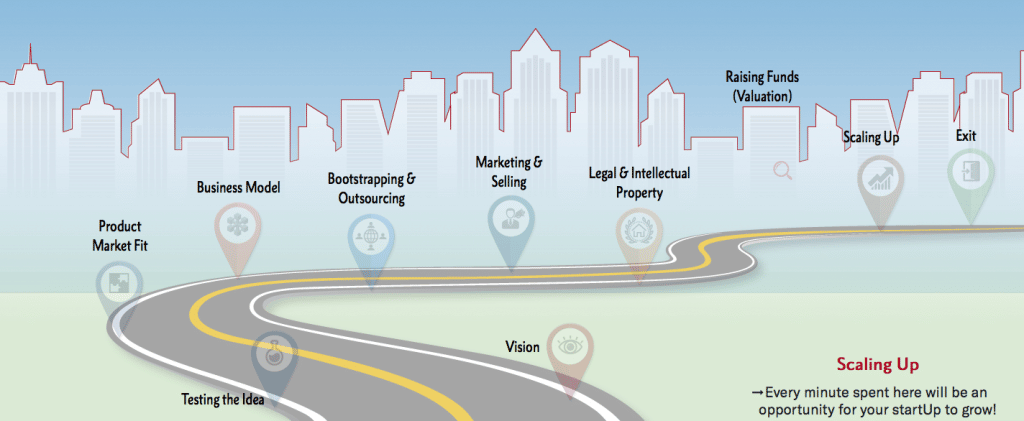So, what really is a startup?
Startup can be thought of as synonymous to innovation. It is basically a company in its initial stages founded by passionate entrepreneurs who believe in solving a problem or filling a gap. A startup goes through many stages, ten to be exact, to reach its maturity. Maturity could mean a successful enterprise or even a unicorn.
Mentoring and Mentors make the journey smoother for startups.
The 10 Startup Stages
1. Vision
It all starts with a leader’s vision. This is the core and the future of a startup.
The vision is sometimes confused with the mission but where mission focuses on short term goals, the vision is a guiding light throughout the life of an enterprise. It is the ultimate purpose & fulfillment of your startup. Without a vision statement, you may think you would do just fine without a vision but in the long run you can get lost.
2. Testing the Idea
You have a mind-blowing idea now what? Is having a mind-blowing idea enough?
Sorry to break it to you but a good idea most of the times do not result in successful startups. To know that your innovative idea is fulfilling a market gap and is not something which does not even have a market, you need to test your idea. Testing is a long process and most of the times you have to rely on your intuition and do trial and error. Design thinking is one way to go about it. Market research is another step where you’ll figure out if the market for your product/service does exist or not.
3. Product Market Fit
In this stage you evaluate how much your product is a fit for the market by identifying your target customers, their unfulfilled needs and you value proposition.
This is the scary moment of the truth. You make a Minimum Viable Product available to your target market and take customer feedback. This stage is crucial for your success. Even if you MVP does not do good, it provides you real-time insights through which you can improve and curate your product according to the actual needs of your target market.
4. Business Model
Your business model is your startups blueprint, the blueprint for revenue generation, sustainability & functionality. At this stage, you need to well-versed in business development. If you are then that’s great but if not then find yourself a mentor who can help you out. You can also attend workshops & trainings to gain the technical skills required.
5. Bootstrapping and Outsourcing
Okay you have sorted through all the technicalities and now you have a fully functional startup what’s next?
Don’t think that the following journey is going to be any easier. This is the point from where onwards you are going to have make some very serious and some very hard decisions. As a startup, it is understandable that you are going to be tight for cash so everything that you do has to be a calculated move. At this stage you cannot afford any impulsive decisions. One of the hard decisions is going to be about outsourcing some of your services. As a startup founder you are expected to figure out everything yourself but it is a toxic practice which can, at times, land your startup in trouble so find service providers and outsource some of your services. Outsourcing will also minimize your costs in the long run.
Handle your accounts and finances through experts!
6. Marketing and Selling
Now that you are in the market, your products, no matter how good, in most cases are not going to sell themselves. In this digital era, make your digital presence prominent from the beginning. Engage with your audience and know who they are. Marketing is the art of people and it is what is going to sell your product/service.
7. Legal and IP
The next step is legal & intellectual property. Is your startup not registered? Do you have solid contracts with your employees and vendors? Is your intellectual property protected? If not, then this is the stage you need to start thinking about this aspect. You need to be a legal entity to scale up, hence, the importance of this step.
8. Raising Funds
The next part of your journey is to scale up but for that you need funds. As a startup, you wouldn’t be making a lot of money so you would have to look for alternative sources. Some of the sources could be government grants & loans from banks. You can also find investors through various websites & your own network.
9. Scaling Up
Now that everything seems to be going well, you need to focus on increasing your capacity which is scaling up, basically. But scaling up has to be done smartly. You don’t want your costs to be increased but rather build your capacity with the existing costs. This can be done by prioritization.
10. Exit
The exit strategy doesn’t, necessarily, means selling off your startup. You can merge with big corporations or scale up by acquiring new startups that have potential. Selling off and starting something new is always an option if you don’t find it fulfilling anymore. And if you don’t want an exit at all, you can let your startup be the cash cow and enjoy your hard-work pay off!
Where does startup.pk fit in your journey?
Startup.pk’s aim is to be your guide and support throughout your journey. Our services are designed especially for startup’s needs and they cater to various stages in your journey. We also aim to provide a community of industry leaders, entrepreneurs & aspirants who, through collaboration, will further our mission of promoting innovation and entrepreneurship.
Still have confusions? Read more in depth about the startup journey!



